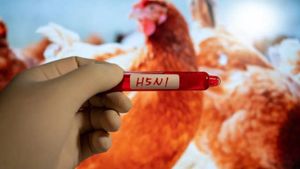A life-saving colonoscopy at 31 — Bri Mahon never imagined her decision would highlight the alarming trend of delayed cancer diagnoses among younger individuals. Just years ago, Mahon was battling gastrointestinal symptoms she attributed to irritable bowel syndrome (IBS), never suspecting something more dire lurked beneath. With colorectal cancer rising among younger demographics, the U.S. Preventive Services Task Force started recommending screenings at 45 instead of the previous age of 50. Mahon's ordeal serves as a chilling reminder of the disease's insidious nature and the importance of seeking timely medical attention.
Reflecting on her past, Mahon described experiencing fatigue and anxiety, symptoms she initially dismissed as stress-related, especially after giving birth to twin boys. “I thought the bleeding was just hemorrhoids from pregnancy,” she recounted on TikTok. It wasn't until noticeable blood appeared during her bathroom visits and her bowel habits fluctuated drastically, alternating between constipation and urgency, prompting her visit to the doctor. A series of tests led to the grim diagnosis: stage 3 colon cancer.
Experts note symptoms such as rectal bleeding should never be ignored. According to Mahon, “It was definitely a sign something was wrong.” Recognizing these warning signals can be lifesaving; she now emphasizes the need for vigilance amid rising cases of colorectal cancer among younger patients.
Contrast this with the story of Fiona Hornsby, who faced her own battle against vulva cancer after experiencing unexplainable symptoms late last year. Following discussions with healthcare professionals, she underwent radical surgeries and radiotherapy, which laid the foundation for her recovery. The turning point for Hornsby came after she found comfort and strength within her “small village” of support: friends, family, and the community at their pubs.
Speaking candidly about her experience, Hornsby shared how she slowly opened up about her diagnosis. “At first, I didn’t want to tell people about my diagnosis but slowly I did, and so many people helped,” she said, highlighting the therapeutic power of community. Her positivity repaid those who helped her during the hardest times; she plans to walk for charity soon.
The emotional recovery after cancer treatment can be as challenging as the medical one, as Hornsby notes: “When we go out, I have to make sure I can have comfortable seating.” Balancing newfound medical realities with everyday life requires adjustments and renewed perspectives post-treatment.
Hornsby’s upcoming participation in the Glow Green charity walk aligns her recovery with giving back. She candidly describes the significance of this goal, saying, “It might be 8 kilometers, but to me, it will be like a marathon.” It symbolizes more than mere distance; it’s about reclamation of her active life post-surgery.
The walk, illuminating significant Liverpool landmarks, is emblematic of hope post-recovery, complete with reflective moments honoring those touched by cancer. Both Mahon and Hornsby’s stories converge on this theme: cancer demands more than just medical treatment; it calls for community and support.
Crucially, both women’s accounts serve as catalysts for empowering others. Their testimonials resonate amid growing concerns surrounding early cancer diagnoses, particularly within young adults who might typically overlook distress signals. Healthcare recommendations undergo scrutiny, yet it often falls on individuals to advocate for their health. Bri Mahon’s early detection through proactive measures exemplifies this action. Meanwhile, Fiona's vibrant spirit and distinct outlook through adversity motivate others to view their struggles as adventures rather than burdens.
Inspired by these stories, oncology experts reiterate: early intervention is monumental. The shift to earlier screening recommendations is timely as it not only emphasizes awareness but aims to improve survival rates.
Moving forward, both Mahon and Hornsby embody resilience and courage, embarking on bold paths toward recovery and purpose. Their narratives underline the importance of awareness, health education, and community support—and perhaps most critically, reinforce the notion: never ignore your body’s warnings.



